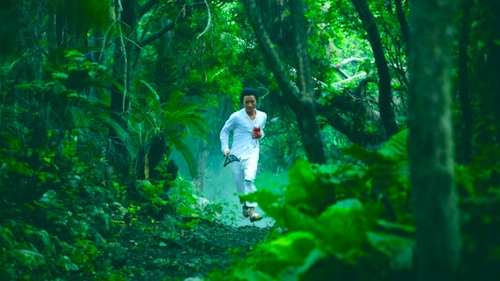
By Joe Bendel. Rui Yoshino’s family heeded the advice of a certain science fiction novelist: they started their own religion. Perhaps ‘cult’ would be a more accurate term. Regardless, his telegenic looks have served the church well during his tenure as “Guru.” Unfortunately, scandal threatens to disrupt the family business in Toshiaki Toyoda’s I’m Flash, which screened as a co-presentation of this year’s Japan Cuts: the New York Festival of Contemporary Japanese Cinema and the New York Asian Film Festival.
The Guru has not been himself lately. Physically, he is fine. He walked away from the car crash that killed a motorcyclist and left his single young lady passenger in a coma. However, the incident has left its mark in other ways, as viewers will learn over time. To protect their frontman and their interests, the family sequesters the Guru in his tropical compound, recruiting three unnamed underworld types to serve as his bodyguards. Their services will indeed be needed.
A controversial figure in his own right, Toyoda bounced back from his unplanned filmmaking hiatus with two wildly idiosyncratic films. His hard-rocking period fantasy Blood of Rebirth is a redemption allegory of unusual power, which will reverberate in viewers’ heads, perhaps for all eternity. His subsequent Monster’s Club, an austere invitation to sympathize with the devil, might have been more about exorcising some of his own tortured demons. Happily, I’m Flash is an eerie return to form and arguably Toyoda’s most accessible film since his “troubles.” In fact, I’m Flash often seems poised on the brink of a caustic noir portrait of corruption in the Chinatown tradition, yet it always remains slyly elusive.

Death Note’s Tatsuya Fujiwara nicely hints at the imp of perverse lurking inside the not-as-dumb-as-he-looks Guru and Ryuhei Matsuda sets off all the right alarms bells as the bodyguard who is not too young and impetuous or old and cantankerous, but just deadly right. Kiko Mizuhara also keeps viewers thoroughly off balance in her flashback sequences as the mystery woman. Still, everybody wilts when sharing the screen with Michiyo Ookusu as the Guru’s Machiavellian mother—have mercy.
Like everything about Toyoda, I’m Flash is bound to be divisive. Those with a taste for intelligently challenging films will appreciate its genuine air of mystery. It is also a surprisingly handsome production, capitalizing on the evocative locale and subtly creepy set design, most notably the Guru’s villa, which looks as if it could grace the cover of both Architectural Digest and Cult Living.
Toyotarô Shigemori’s cinematography is also weirdly effective, in a way that is difficult to pin down. Over-used as a form of critical shorthand, the term “fever dream” does not really apply here. This is clearly our world, in broad daylight, but something still feels not quite right. Very highly recommended for the moderately adventurous, I’m Flash screened at the Japan Society on the opening night of this year’s Japan Cuts, in conjunction with the New York Asian Film Festival.
LFM GRADE: A
Posted on July 15th, 2013 at 9:30am.